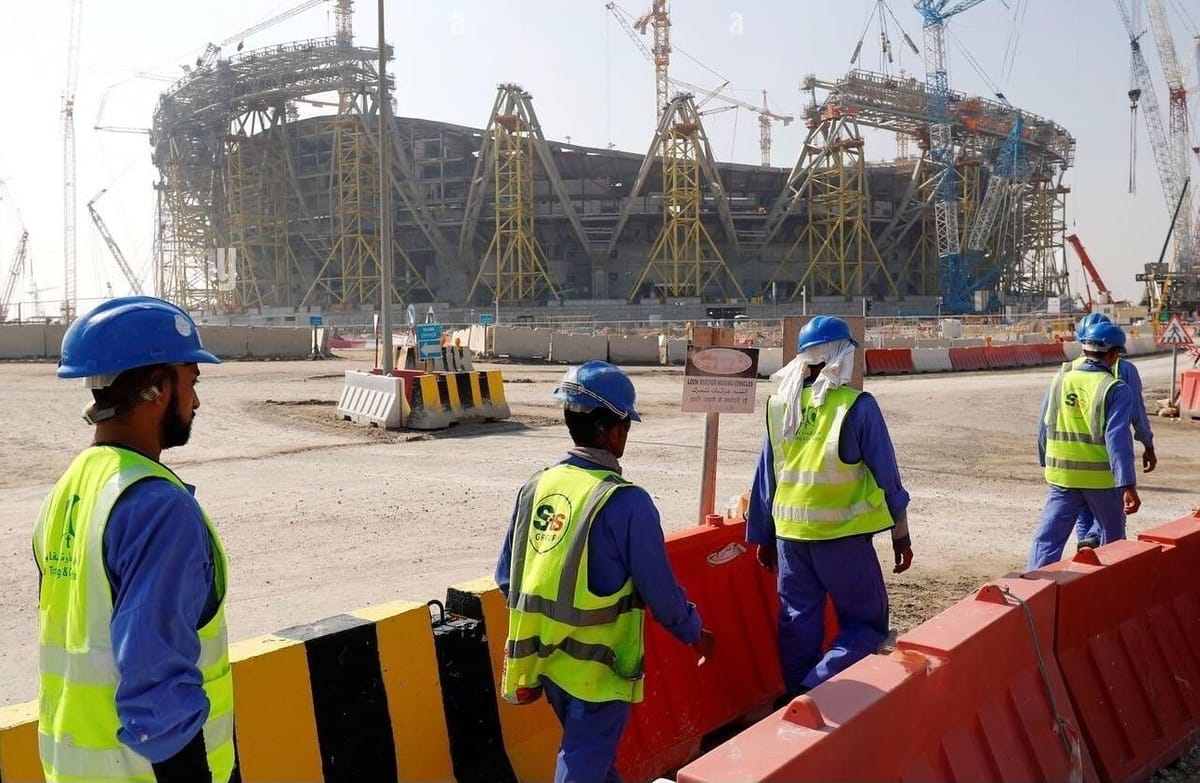Qatar World Cup and Migrant Workers: the West vs. ‘the Rest’

By Mahdiya Mizan, BA International Relations
With the 22nd World Cup tournament kicking off in Doha last Sunday, the world’s outrage over the host’s human rights abuses has blown out of proportion. The significant media attention over Qatar’s exploitation of migrant workers reinforces the West’s insecurity of seeing a Muslim country gaining prominence in hosting a major international event. I aim not to make the issue of Qatar’s abuses towards migrant workers a trivial matter. However, we must acknowledge that this magnifying media attention was not equivalently expressed during Russia’s hosting of the 2018 World Cup. The West aims to tamper the reputation of the first Muslim nation hosting the World Cup by gnawing at all that is wrong with the state as means to alleviate them from their insecurity and give them the moral high ground.
“The West aims to tamper the reputation of the first Muslim nation hosting the World Cup by gnawing at all that is wrong with the state as means to alleviate them from their insecurity and give them the moral high ground.“
Why is Qatar hosting ‘the most controversial World Cup in history,’ according to the BBC? The Council of Foreign Relations describes the kafala (sponsorship) system where ‘…the state gives local individuals or companies sponsorship permits to employ foreign labourers…The sponsor covers travel expenses and provides housing, often in dorm-like accommodations or, in the case of domestic workers, the sponsor’s home.’ The kafala system is used across Gulf Cooperation Council (GCC) countries, including Qatar, Kuwait, Saudi Arabia and the UAE. Such a system has opened up various job opportunities in the run-up to the tournament for largely South Asian and African labourers. Sponsor relations are a mechanism for Gulf countries to acquire cheap labour; why must then, the West strongly scrutinise Qatar and the system when they also outsource cheap labour to countries such as Bangladesh?
Whilst this system has allowed for mass job opportunities for migrant workers, the abuse of power and exploitation workers have experienced from their employers has outweighed its benefits. Such exploitation ranges from delayed or refused payment of salaries to the inability to change jobs without receiving permission from their sponsors. Since Qatar was chosen to host the tournament in 2010, the Guardian recorded 6,500 deaths of South Asian migrant workers in the past 11 years due to poor working conditions in Qatar’s 40-degree heat. Sponsor relations have also enabled racial and gender discrimination. A UN report published in 2020 found that Qatari labour laws ‘…condition human rights significantly on the basis of national origin and nationality.’
Western countries, in particular, are utilising the World Cup platform to voice poor working conditions in Qatar. This has allowed for increased awareness of the issue of the kafala system in exploiting and discriminating against migrant workers. Hence, the Qatari government responded to criticisms by introducing policy changes in an effort to reform the kafala system.
Changes to the system stated by Human Rights Watch include allowing ‘…migrant workers to change jobs without employer permission and set a higher minimum wage for all workers, regardless of nationality.’ The Guardian found that ‘Changes to the Kafala system have led to labour mobility. Now workers can negotiate for better conditions, and employers are incentivised to provide them in order to attract and retain talent.’ Critics, however, are yet to see whether these reforms will follow through post-tournament.
Nevertheless, there remains an unprecedented media backlash over Qatar’s treatment towards migrant workers, as this was not apparent when previous countries, such as Russia, hosted the World Cup. Russia’s football culture triggered multiple racial and homophobic incidents in the lead-up to the tournament in 2018; The Guardian stated that Russia’s football hooligans ‘Ultras in St Petersburg in 2012 released a manifesto demanding their team refuse to sign non-white and gay players.’ Russia was not pressured by the international community to the extent Qatar is now. The extreme international concern expresses a deep power imbalance between the West and non-Western countries, with Qatar having to appease the West’s protest over labour conditions and rights.
International disapproval towards Qatar’s treatment of migrant workers goes further than this. The New York Times shared that Qataris ‘…are calling out the double standards. Why, they ask, do Europeans buy natural gas from Qatar if they find the country so abhorrent that they cannot watch soccer there? Why don’t some of the international figures who have spoken out against Qatar do the same for the United Arab Emirates?’ Qataris hope to use the platform of the World Cup to challenge the stereotypes of the Arab and Muslim cultures. Yet, the West are, in fact, abusing their value of human rights to undermine Qatar as the media is out to spin Qatar’s actions to reinforce racism, Orientalism and Islamophobia.
Photo Caption: Workers at the construction site of Lusail Stadium (Credit: Kai Pfaffenbach / Reuters).



